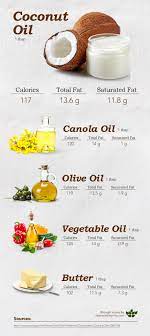A Comprehensive Guide to Finding the Perfect Substitute for Coconut Oil in Your Cooking and Beauty Routine
Coconut oil has gained significant popularity in recent years for its numerous health benefits and versatile uses. However, if you are looking for alternatives to coconut oil, whether due to personal preference, dietary restrictions, or simply wanting to try something new, you’re in luck. There are several other oils that can be just as beneficial for cooking and beauty purposes.
One fantastic alternative is olive oil. Not only is olive oil rich in heart-healthy monounsaturated fats, but it also boasts a multitude of vitamins and antioxidants. This makes it an excellent choice for cooking and baking, as well as for moisturizing and nourishing the skin and hair. Whether you’re sautéing vegetables or seeking a natural makeup remover, olive oil can be a great substitute for coconut oil.
Another fantastic option is avocado oil. Avocado oil is known for its high smoke point, making it perfect for high-heat cooking methods like frying and grilling. It is also packed with antioxidants and healthy monounsaturated fats, making it a great choice for skincare. Whether you’re using it as a cooking oil or as a natural moisturizer, avocado oil can provide many of the same benefits as coconut oil.
Argan oil is another excellent alternative worth considering. Derived from the kernels of the argan tree, this oil has been used for centuries in Morocco for its nourishing and healing properties. Argan oil is rich in vitamin E, essential fatty acids, and antioxidants, making it a potent ingredient in both cooking and beauty routines. From drizzling it over salads to using it as a facial moisturizer, argan oil can be a fantastic substitute for coconut oil.
Healthy Oils for Cooking and Beauty
Coconut oil is not the only healthy oil that can be used for cooking and beauty purposes. There are several other options available that offer various health benefits and can be a great alternative to coconut oil.
One of the popular alternatives is olive oil, which is rich in monounsaturated fats and antioxidants. It has a mild flavor and can be used in cooking, salad dressings, and even as a moisturizer for the skin.
Avocado oil is another excellent choice, as it contains high levels of healthy fats, vitamins, and minerals. It has a higher smoke point than coconut oil, making it suitable for high-heat cooking methods like frying and sautéing.
Another oil worth considering is almond oil, which is rich in vitamin E and other essential nutrients. It is commonly used in skincare products and can also be used for cooking, baking, and salad dressings.
Grapeseed oil is a light and neutral-tasting oil that is often used in cooking and beauty products. It is high in polyunsaturated fats and vitamin E, making it a healthy alternative to coconut oil. It can be used for frying, baking, and as a base for homemade skincare products.
Argan oil is a highly nutritious oil that is derived from the argan tree. It is rich in antioxidants, vitamin E, and essential fatty acids. It is commonly used in hair care products and can also be used for cooking and salad dressings.
These are just a few examples of the many healthy oils available for cooking and beauty purposes. It is essential to choose oils that are minimally processed and of high quality to maximize their health benefits. Experiment with different oils to find the ones that suit your cooking and beauty needs the best.
| Oil | Health Benefits | Uses |
|---|---|---|
| Olive oil | Rich in monounsaturated fats and antioxidants | Cooking, salad dressings, skincare |
| Avocado oil | High in healthy fats, vitamins, and minerals | High-heat cooking, skincare |
| Almond oil | Rich in vitamin E and essential nutrients | Cooking, baking, salad dressings, skincare |
| Grapeseed oil | High in polyunsaturated fats and vitamin E | Cooking, baking, skincare |
| Argan oil | Rich in antioxidants, vitamin E, and essential fatty acids | Skincare, cooking, salad dressings |
Olive Oil
Olive oil is another popular alternative to coconut oil in both cooking and beauty routines. Like coconut oil, olive oil is rich in healthy fats and has a range of benefits for the skin, hair, and overall health.
When it comes to cooking, olive oil is a great option for sautéing, frying, and even baking. Its high smoke point makes it suitable for high-temperature cooking methods. Olive oil adds a delicious flavor to dishes and can be used in salad dressings or as a finishing touch to enhance the taste.
In terms of beauty, olive oil is a natural moisturizer that can be used on the skin and hair. It is rich in antioxidants and vitamin E, which help to nourish and hydrate the skin, leaving it soft and smooth. Olive oil can also be used as a hair conditioner to add shine and reduce frizz.
When choosing olive oil, it’s important to look for extra virgin olive oil, which is the highest quality and has the most health benefits. Extra virgin olive oil is made from pure, cold-pressed olives, without any chemicals or heat treatments.
Benefits of Olive Oil:
- Rich in healthy fats: Olive oil is a good source of monounsaturated fats, which are heart-healthy and can help reduce inflammation.
- Antioxidant properties: Olive oil contains antioxidants that can help protect the body from oxidative stress and free radicals.
- Moisturizing effects: Olive oil is an effective natural moisturizer for the skin and hair, helping to lock in moisture and prevent dryness.
- Good for heart health: The monounsaturated fats in olive oil can help lower bad cholesterol levels and reduce the risk of heart disease.
In conclusion, olive oil is a versatile and healthy alternative to coconut oil. Whether used in cooking or beauty routines, olive oil offers a range of benefits for the body and is a staple in many households.
Avocado Oil
Avocado oil is another excellent alternative to coconut oil for both cooking and beauty purposes. It is extracted from the pulp of avocados and has a mild, buttery flavor that works well in a variety of dishes.
In terms of cooking, avocado oil has a high smoke point, making it suitable for frying, sautéing, and roasting. It also has a good balance of monounsaturated fats, which can help to lower bad cholesterol levels and reduce the risk of heart disease.
Avocado oil is also a popular choice for beauty and skincare routines. It is rich in vitamins A, D, and E, which are known for their nourishing and moisturizing properties. It can be used as a natural moisturizer for the skin, hair, and nails, helping to keep them hydrated and healthy.
Benefits of Avocado Oil:
- High smoke point, making it suitable for cooking at high temperatures
- Rich in monounsaturated fats, which can help to reduce bad cholesterol
- Contains vitamins A, D, and E, which are beneficial for the skin and hair
- Has a mild, buttery flavor that enhances the taste of dishes
- Can be used as a natural moisturizer for the skin, hair, and nails
Whether you’re looking to elevate your cooking or enhance your beauty routine, avocado oil is a versatile and healthy alternative to coconut oil. Give it a try and reap the many benefits it has to offer!
Jojoba Oil
Jojoba oil is a popular alternative to coconut oil for both cooking and beauty purposes. Derived from the seeds of the jojoba plant, this oil is rich in essential vitamins, minerals, and fatty acids that offer numerous health benefits.
For Cooking
Jojoba oil has a high smoke point, making it suitable for cooking at high temperatures. Its neutral flavor and aroma make it a versatile option for various dishes, including stir-fries, sautés, and baking. Additionally, jojoba oil contains monounsaturated fats, which are known to promote heart health and reduce bad cholesterol levels.
For Beauty
Jojoba oil is often used in skincare routines due to its moisturizing and nourishing properties. It closely resembles the sebum produced by our skin, making it an excellent natural moisturizer for all skin types. It can help balance oil production, soothe dryness, and promote a healthy complexion.
Furthermore, jojoba oil is non-comedogenic, meaning it won’t clog pores or cause breakouts. It can be used as a gentle makeup remover, a facial cleanser, or a natural hair conditioner. Its antibacterial properties also make it effective in treating acne and other skin conditions.
Comparison to Coconut Oil
While jojoba oil shares some similarities with coconut oil, it has a different composition and properties. Jojoba oil is a liquid wax, while coconut oil is a solid fat. This difference makes jojoba oil more easily absorbed by the skin and less likely to cause greasiness.
Additionally, jojoba oil has a longer shelf life than coconut oil, as it is more resistant to rancidity. It can be stored for extended periods without losing its quality.
| Jojoba Oil | Coconut Oil |
|---|---|
| High smoke point | Low smoke point |
| Neutral flavor and aroma | Distinct coconut flavor and aroma |
| Similar to skin sebum | Not similar to skin sebum |
| Longer shelf life | Shorter shelf life |
In conclusion, if you’re looking for an alternative to coconut oil, jojoba oil is a great choice. It offers various health benefits, works well in cooking, and provides excellent skincare benefits. Give it a try and enjoy the versatility of jojoba oil!
Sesame Oil
Sesame oil is another fantastic option for cooking and beauty purposes. It has a rich, nutty flavor that adds a delicious taste to your dishes. Sesame oil is a popular choice in Asian cuisines, especially for stir-frying and sautéing.
In terms of beauty, sesame oil works wonders for your skin and hair. It is rich in antioxidants, vitamins, and minerals that nourish and moisturize your skin. Sesame oil is often used in oil cleansing methods and as a natural moisturizer. It can help soothe dry and irritated skin, leaving it soft and supple.
Additionally, sesame oil can benefit your hair by promoting hair growth, reducing dandruff, and adding shine to your locks. You can apply sesame oil to your scalp as a hair mask or mix it with your favorite hair products for extra nourishment.
When using sesame oil for cooking or beauty, make sure to choose cold-pressed, unrefined versions to retain its natural nutrients and flavor. It is also important to moderate your consumption or usage, as sesame oil has a strong flavor and can overpower other ingredients if used in excess.
Overall, sesame oil is a versatile alternative to coconut oil that can enhance both your cooking and beauty routine. Give it a try and experience its amazing benefits!
Argan Oil
Argan oil is derived from the kernels of the argan tree, which is native to Morocco. It has been used for centuries in cooking and for beauty purposes. Argan oil is rich in antioxidants, essential fatty acids, and vitamin E, making it a nourishing option for both the kitchen and your skin.
Cooking with Argan Oil
Argan oil has a nutty flavor that adds depth to dishes. It can be used as a finishing oil, drizzled over salads, roasted vegetables, or used to marinate meat. However, it is important to note that argan oil has a low smoke point, so it is not suitable for high-heat cooking methods like frying or sautéing. The delicate flavors and nutrients can be easily damaged by high temperatures, so it is best to use argan oil in recipes that don’t require much heat.
Beauty Benefits of Argan Oil
Argan oil is known for its nourishing and moisturizing properties, making it a popular ingredient in skincare and haircare products. It can be used as a facial moisturizer, body lotion, or hair conditioner. Its antioxidant content helps protect the skin from environmental damage and can reduce the appearance of fine lines and wrinkles. Argan oil is also lightweight and non-greasy, making it suitable for all skin types.
In addition to its moisturizing properties, argan oil also has antimicrobial and anti-inflammatory properties, which can help soothe acne-prone skin and reduce inflammation. It can also be used to moisturize dry and damaged hair, leaving it soft, shiny, and more manageable.
When using argan oil for beauty purposes, ensure that you are using pure, 100% argan oil without any added ingredients or fragrances. This will ensure that you are getting the full benefits of this natural oil.
In conclusion, argan oil is a versatile and nourishing alternative to coconut oil. Whether you choose to use it in cooking or for beauty purposes, it is a great option to consider.
Grapeseed Oil
Grapeseed oil, made from the seeds of grapes, is a versatile oil that can be used for cooking and various beauty applications. It has a light and neutral flavor, making it a great substitute for coconut oil in culinary recipes.
Cooking
Grapeseed oil has a high smoke point, making it suitable for high-temperature cooking methods such as frying and sautéing. Its neutral taste won’t overpower the natural flavors of the ingredients, allowing them to shine. It can be used for roasting vegetables, grilling meats, and making salad dressings.
Grapeseed oil is also low in saturated fat and has a good balance of omega-6 and omega-9 fatty acids, which are beneficial for heart health. Its light texture and high amount of antioxidants make it a healthier alternative to other cooking oils.
Beauty
In addition to its culinary uses, grapeseed oil is popular in the beauty industry due to its moisturizing and nourishing properties. Its light and non-greasy texture make it suitable for all skin types, including oily and acne-prone skin.
Grapeseed oil can be used as a natural moisturizer for the face and body. It helps to lock in moisture, smooths the skin, and reduces the appearance of wrinkles and fine lines. The oil is easily absorbed by the skin, providing hydration without clogging pores.
Furthermore, grapeseed oil contains antioxidants and vitamin E, which help to protect the skin from free radicals and environmental damage. It can be used as a massage oil, hair conditioner, and even as a makeup remover.
Overall, grapeseed oil is a versatile alternative to coconut oil, offering both culinary benefits and beauty advantages. Whether you are looking to cook delicious meals or enhance your skincare routine, grapeseed oil is a great option to consider.
“FAQ:” Substitute for coconut oil
What is a suitable substitute for coconut oil in baking, especially in recipes that call for coconut oil?
A suitable substitute for coconut oil in baking is vegetable oil, which provides a similar texture and works well in various recipes that originally call for coconut oil.
Can you recommend the best coconut oil substitute for vegan baking, considering the need for plant-based options?
For vegan baking, the best coconut oil substitute is vegetable oil or other plant-based oils like olive oil or canola oil, ensuring a cruelty-free and vegan-friendly choice.
What would be the best replacement for coconut oil if you need a neutral oil that doesn’t impart a distinct flavor to your dish?
If you’re looking for a neutral oil replacement for coconut oil, vegetable oil is an excellent choice. It maintains a neutral flavor profile, making it versatile in various recipes.
How does hazelnut oil compare as a substitute for coconut oil, and in what types of dishes can hazelnut oil be used effectively?
Hazelnut oil can serve as a substitute for coconut oil, offering a unique flavor. It is best used in specific dishes like muffins, where the hazelnut flavor complements the overall taste.
Is hemp seed oil a viable replacement for coconut oil, and what characteristics make it suitable as a substitute?
Hemp seed oil can be a viable replacement for coconut oil, especially in recipes that can benefit from its nutty flavor. It is a good source of omega-3 fatty acids and adds a distinct taste to dishes.
When baking, can you use olive oil as a substitute for coconut oil, and how does it affect the overall flavor of the baked goods?
Yes, olive oil can be used as a substitute for coconut oil in baking. However, it may impart a slightly fruity flavor to the baked goods, so it’s important to consider the overall flavor profile of the dish.
In recipes that call for coconut oil, can canola oil be used as an effective substitute, and are there any considerations to keep in mind?
Canola oil can be an effective substitute for coconut oil in recipes. It is a neutral oil, and its light flavor makes it suitable for various dishes. Consider the specific flavor requirements of your recipe.
How does coconut milk function as a substitute for coconut oil in recipes, and in what types of dishes can it be successfully used?
Coconut milk can be a substitute for coconut oil, especially in recipes that require a creamy texture. It works well in dishes like curries and soups where coconut flavor is desirable.
What is considered the best substitute for coconut oil in baking, especially when you need an alternative that seamlessly replaces the properties of coconut oil?
Sunflower oil is often considered the best substitute for coconut oil in baking, offering a neutral flavor and similar texture that works well in various recipes.
Can you recommend the best substitute for coconut oil when you need a versatile option that can be used in place of coconut oil in multiple culinary applications?
Sunflower oil stands out as the best substitute for coconut oil due to its versatility. It can seamlessly replace coconut oil in various cooking and baking scenarios without significantly altering the end result.
When you need a substitute for coconut oil in baking, what qualities make sunflower oil an ideal choice for maintaining the integrity of your recipes?
Sunflower oil serves as an ideal substitute for coconut oil in baking due to its neutral taste, light texture, and ability to preserve the intended flavor profile of the dish without introducing a distinct oil flavor.
In recipes that call for coconut oil, how can sunflower oil be effectively used as a substitute, and are there any adjustments needed for a successful outcome?
Sunflower oil can be used as a substitute for coconut oil in recipes by replacing it in a 1:1 ratio. It is a versatile option that requires minimal adjustments, making it easy to seamlessly incorporate into your favorite dishes.
When considering a substitute for coconut oil in baking, what makes sunflower oil a reliable choice, and how does it contribute to the overall success of recipes that traditionally use coconut oil?
Sunflower oil’s reliability as a substitute for coconut oil lies in its ability to maintain the desired texture and moisture in baked goods. Its neutral flavor ensures that the original taste of the recipe remains intact, making it a successful alternative in various baking applications.
Can you substitute virgin coconut oil with other oils, and are there specific oils that mimic the properties of virgin coconut oil?
While it may be challenging to fully replicate the unique properties of virgin coconut oil, other oils like avocado oil or grapeseed oil can be used as substitutes, each imparting its own distinct characteristics.
When substituting olive oil for coconut oil in vegan baking, what adjustments might be necessary to ensure a successful outcome?
When using olive oil as a substitute for coconut oil in vegan baking, consider the slightly fruity flavor of olive oil. Adjust the quantity to match the desired taste and texture in your recipes.
How does safflower oil compare to unrefined coconut oil in terms of its smoke point, and why might one choose safflower oil as a substitute?
Safflower oil generally has a higher smoke point compared to unrefined coconut oil, making it a suitable substitute for cooking at higher temperatures without compromising the dish’s quality.
What distinguishes refined coconut oil from unrefined coconut oil, particularly in terms of smoke point and flavor, and how does it impact their respective uses in cooking or baking?
Refined coconut oil has a higher smoke point and a milder flavor compared to unrefined coconut oil. This makes refined coconut oil a better choice for high-heat cooking and baking where a neutral taste is preferred.
When considering alternatives to coconut oil in baked recipes, why is avocado oil often recommended, and how does it contribute to the final outcome?
Avocado oil is an excellent substitute for coconut oil in baked recipes due to its neutral flavor and similar texture. It ensures that the baked goods maintain the desired moisture and consistency.
In what situations might sunflower oil be a preferred substitute for coconut oil, and how does it compare to coconut oil in terms of flavor and use in both cooking and baking?
Sunflower oil is an excellent substitute for coconut oil, especially when a neutral flavor is desired. It works well in both cooking and baking, providing a light taste similar to coconut oil without the distinct coconut flavor.
Can you elaborate on the characteristics of olive oil that make it a suitable replacement for coconut oil in certain recipes, and how does it fare when used in place of coconut oil in both savory and sweet dishes?
Olive oil is a versatile substitute for coconut oil, offering a rich flavor that can complement both savory and sweet dishes. Its distinctive taste adds depth to recipes, making it a great replacement, particularly in Mediterranean-inspired or savory recipes.




